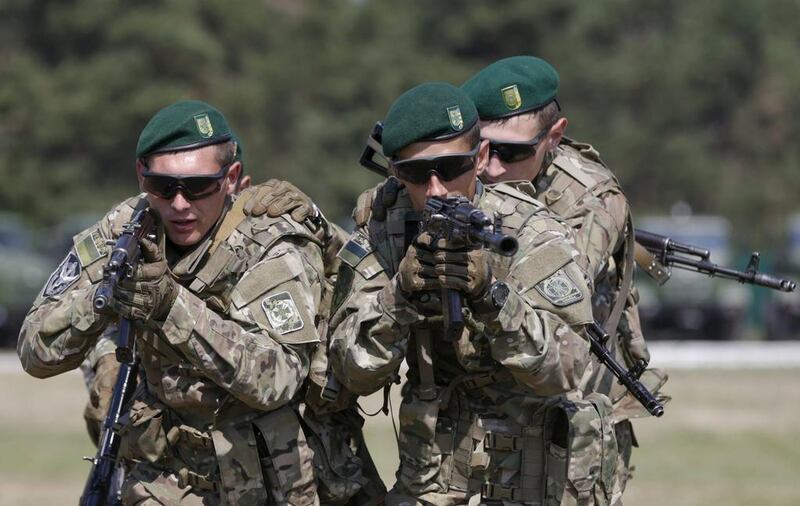Last week Vladimir Putin made a trip to Italy, during which the country's prime minister, Matteo Renzi, expressed his hope that a phase of "diatribes and sanctions" against Russia ends soon. Mr Putin also had a meeting with the Pope, departing with a gift – a medallion of an "angel of peace".
At the weekend, the Russian leader received a rather different message: news that the Pentagon is proposing to place heavy weaponry that could supply up to 5,000 troops in Eastern European Nato states that were once part of the Soviet Bloc. This “plan to put tanks on Putin’s doorstep”, as Bloomberg called it, has been described as “a very meaningful shift in policy” by Nato’s Admiral James Stavridis, the former Supreme Allied Commander Europe.
Coming just days after the G7 threatened the possibility of further sanctions, one could be forgiven for wondering whether most western leaders actually desire peace and friendship with Russia. The current course of action, after all, suggests that they require nothing short of a capitulation and apology so abject that Mr Putin could not possibly agree without being utterly humiliated, but there is nothing to suggest he is even remotely minded to entertain the possibility of backing down, which seems both unlikely and, frankly, out of character.
He has already made it clear that military intervention against western allies is out of the question. “Only an insane person and only in a dream can anyone imagine that Russia would suddenly attack Nato,” he said in a recent interview. “I think some countries are simply taking advantage of people’s fears with regards to Russia.”
The current situation is looking dangerously like a Cold War II stand-off, both sides bristling with hostility and neither wanting to make concessions to ease the tension. But let us step back and remind ourselves of the relatively recent history that has brought us to this point.
As Robert Hunter, US ambassador to Nato in the mid-1990s, recalls, the first president Bush’s “answer to the Russia conundrum” after the 1991 collapse of the Soviet Union and its satellite empire “was to create a ‘Europe whole and free and at peace’, embracing everyone. He sought to avoid in Russia a repetition of Germany’s humiliation after the First World War, which had led to the revanchism of the 1930s.”
But before long, he continues: "The West (and particularly the US) took advantage of a weakened Russia. In 2002, Washington gratuitously abrogated the anti-ballistic missile treaty, which had given Moscow psychological parity with Washington even after it lost the cold war." More disastrously still, Nato quite unnecessarily extended its membership to the Baltic States and others in eastern Europe. Russia's feeling of encirclement only deepened as Nato promised membership to Ukraine and Georgia in 2008 – a provocation too far that led to Russia invading Georgia and putting that former Soviet Republic firmly in its place. As Mr Hunter notes: "No Nato ally helped Georgia defend itself. The lessons Mr Putin learnt then might go some way to explaining what he has done in Ukraine."
So where do we go from here? Sanctions are clearly not having effects sufficient to persuade the Kremlin to change course. Indeed, when the rouble has been one of the best performing currencies this year and when investors, as the Wall Street Journal put it in April, “have taken Russia out of the penalty box”, they increasingly look as though they can be ignored.
An ongoing frozen conflict in Ukraine is no problem for Moscow. It has lived with – arguably encouraged – them for years, from Transnistria in Moldova to Abkhazia in Georgia.
Continuing escalation is possible, but foolhardy. It will harden anti-western sentiment in Russia and increase the risk of accidental confrontations that could lead to more serious conflict. A more sensible way forward has been suggested by Leslie Gelb, President Emeritus of the Council on Foreign Relations in the US. Outlining what he refers to as “Détente Plus” in The National Interest recently, he wrote: “An effective diplomatic strategy has to be rooted in what matters most to Russian leaders – their historical sense of self and their passion to be treated as a great power ... It is totally unrealistic to think that the West can gain desired Russian restraint and cooperation without dealing with Moscow as a great power that possesses real and legitimate interests, especially in its border areas.”
Such open recognition and inclusion at every international level is key. For it should be clear by now that Russia’s actions can only be influenced when it is part of a dialogue, when it is treated seriously and when it has something to gain in exchange for giving something up.
If the G8 is to be a relevant gathering in the future, that means bringing Russia back in, as the former French president Valery Giscard d’Estaing is reported to have urged. It means not just talking about but actively working towards a free-trade zone encompassing the European and Eurasian Unions. “It was Putin’s idea,” said the German Vice Chancellor Sigmar Gabriel at Davos in January. “In a different world than we are in today, it would be a good idea.”
That’s the wrong way round. Put that “good idea” – and others, including Gelb’s – first, and the “different world” Mr Gabriel desires may be much more likely to transpire. You can’t have a win-win result when you exclude one player from the game – still less when you install tanks on his doorstep.
Sholto Byrnes is a Senior Fellow at the Institute of Strategic and International Studies, Malaysia





